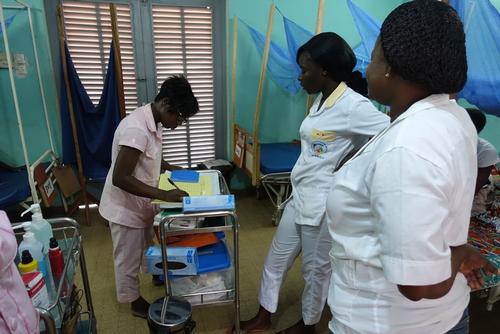From January to February 2015, Dr. Bernard Guillon worked at the maternity centre started by MSF and the Ivorian Ministry of Health in Katiola, Côte d’Ivoire, in a region where maternal and child mortality are serious public health problems. He tells the story of three patients.
“Kpaktitcho gave birth to twins, a boy and a girl, with no problems. While she hadn’t done all of the antenatal visits (far from it), she was in good health and worked in the fields right up to the end of her pregnancy. Her newborns were small, however; the girl weighed 1.8 kg and the boy 1.7 kg. They were each wrapped in a pagne. Though it was 33°C during the day, it might be “only” 25°C at night. The little girl had good tonicity and nursed heartily, but the little boy had more difficulty, and soon became dehydrated. We asked the advice of the hospital paediatrician, who decided to infuse him. But despite the warming lamp, his temperature dropped to 35.6°C. He was hypotonic and showed no sucking reflex. So we gave him some of his mother’s milk with a syringe, but he had trouble swallowing. I then recommended putting the infant skin-to-skin with his mother. After an hour of this simple, inexpensive treatment, the baby’s temperature rose to 36.7°C and he began opening his eyes and taking his mother’s breast. We repeated the treatment the next morning, and this time, after two hours of skin-to-skin contact, the baby perked up and eagerly began to nurse. After a few days, both of Kpaktitcho’s newborns had gained weight and the team watched with relief as the family headed back to their village.”
Pregnant women with multiple health conditions
“Adjare delivered her first child in the Tafiré health centre, about 80 km from Katiola; he was a beautiful, healthy boy. She had had to take a “moto taxi” over bad roads to get from her village to Tafiré.
Six days after her delivery, Adjare was referred to us. Again she had to climb onto a moto taxi, along with her aunt, who would take care of her during her hospital stay. She had persistent abnormal postpartum bleeding and very severe anaemia. The tests done when she arrived showed that she had contracted malaria, on top of a severe uterine infection and sickle cell crisis[*]. Adjare is Fulani, and the custom in that community is for pregnant women to live on milk and cereal during their pregnancy. Such a nutrient-poor diet makes it easier for anaemia to develop. Malaria – which is endemic in Côte d’Ivoire – further exacerbates the situation, and for some women, sickle cell disease adds yet another complication. Adjare stayed in the hospital for several days getting treated with antibiotics. Without them she would have died from what, in the old days, used to be called “childbed fever.” We treated her malaria and fed her a balanced diet. We also gave her a transfusion. She was then able leave with her baby and her aunt – again by “moto” – and go back to her village.”
Hours of travel to get to the maternity centre.
“But not all stories turn out so well. I remember one woman whose babies we couldn’t save, despite all our efforts. Often, patients are sent to us from health centres far away. In some cases, these soon-to-be mothers had already travelled many kilometres just to get to the health centre. There’s hardly any transportation available at night; the roads are bad and there aren’t any lights. Travel is dangerous. Even if they’re having contractions and have gone into labour, mothers often wait until daybreak to go to a health care facility. And if there are complications, the results can be tragic. Early in her pregnancy, Hatichitcho had had two visits with a midwife. But she had had to deliver by caesarean section twice in the past, which meant that she should have had more regular follow-up and her delivery should have been scheduled an appropriate facility. Yet Hatichitcho did not go back to the midwife, and nothing had been prepared. At the health centre her baby, who was fairly big, presented in breech position. So they sent her to the hospital for a caesarean section to prevent her uterus from rupturing. Sadly, it took too long to get here, and the baby was dead by the time they arrived in Katiola. Hatichitcho was quickly prepped for surgery. No one dared tell her, right away, that her child was dead – neither the staff nor the family that came with her. We had to tell her the sad truth the next morning, and cope with her grief. She left the hospital after a few days, with no medical complications and with very strict recommendations for her next pregnancy.”
In collaboration with the Ivorian Ministry of Health, MSF began its mother and child health activities on 4 July 2014 at the regional hospital in Katiola, a town 55 km north of Bouaké in the central region of Hambol. The project’s objective is to offer support and high quality care to pregnant women and their newborns. MSF treats gynaecologic, obstetric and neonatal emergencies. In November 2014, MSF medical teams performed 170 deliveries, 19 of them by caesarean section.



